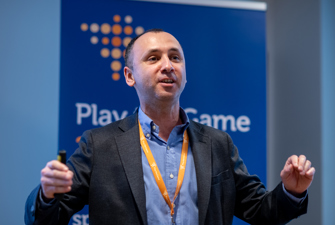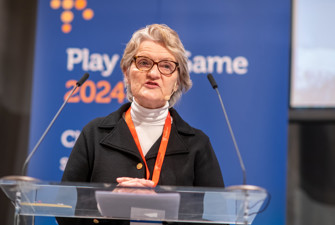Male footballers could have twice the risk of dying from cardiac issues
compared to men of similar age
New figures into sudden deaths on the football pitch were detailed at Play the Game 2024 by researcher Gerke Berenschot who called on sports federations to introduce more robust medical testing regimes.
“Physical activity is undoubtedly good for our health, but the fact is that heart problems are more common among high-performing athletes. This has always been the case and we aren’t giving it enough attention.”
This statement came from Gerke Berenschot, a researcher and author from the Netherlands, during a session at Play the Game 2024 where he presented his comprehensive global study into fatal cardiac arrests suffered by professional and semi-professional footballers during play.
Although previous academic work has been published on the issue, he said, it has been hindered by obstacles like language barriers, unreliable media monitoring and varying forensic protocols. To address some of these issues, Berenschot used so-called open-source intelligence techniques and AI-driven translation tools in over 40 languages.
The research, which did not include female athletes or players who recovered, sourced and monitored media reports from 155 national leagues that encompassed over 6000 teams and 155,000 players.
Relatively high fatality rates in Brazil and West Africa
The research did not identify the cause of the cardiac arrests, but it showed a surprising variation in the number of annual incidents as well as geographical disparities. While on-field cardiac deaths remain very rare, Berenschot said, regions with relatively high fatality rates included Brazil and West Africa.
“This made sense for Brazil as Brazilian football contributed the highest number of professional players in the examined population. However, players active in African club football only made up 19 percent of the total number of players observed. Since 2010 they have made up 36 percent of deaths,” he said.
Berenschot referred to difficulties in comparing on-field cardiac deaths to those in the general population. However, he said, strong evidence exists showing that the number of cardiac deaths suffered by professional athletes is significantly higher than similarly aged males with a less active lifestyle.
“Could there be sports-specific reasons for on-field deaths?” Berenschot asked and answered the question himself.
“Definitely. An active lifestyle makes your life better and on average you will live longer. But if you practice a lot of sport your chances of dying from cardiac issues could be twice as high as for others of a similar age.”
“There are a number of different factors coming into play here. A certain number of people will have underlying or congenital heart issues. For someone who lives a relatively sedentary lifestyle these will not come to the fore because the heart is not under a lot of stress. That has been shown in large population studies,” Berenschot explained.
“Specifically looking at football professionals, the stress hormones that you produce when you are under a lot of pressure are not good for the cardiovascular system. Other contributing factors could be a high use of anti-inflammatory drugs, caffeine or other stimulants, playing or training in high temperatures and possibly doping.”
Attempts to link deaths to COVID-19 vaccine
Sudden heart deaths on the field have been used by opponents of the COVID-19 vaccine as evidence that it unsafe, and at first glance Berenschot’s figures appear to add weight to these claims. They show a significant spike in on-field deaths in 2021, the year that the vaccine was first rolled out. However, the high figures for that year could have been caused by other pandemic-related factors, Berenschot said.
“I don’t think you can comprehensively rule out anything, but I did speak with some cardiologists about the underlying causes for the 2021 figures. In 2020 most sports competitions were stopped due to the pandemic, and then in 2021 they tried to play a lot of matches in a short period of time. The stress load was higher on players who previously had been in better shape. This will have elevated the strain," he said.
“Undoubtedly I have benefited from the large number of people [among the general public] interested in finding cases post-2020,” Berenschot said. “It felt like I was getting a lot of ‘help’. At the same time, this could imply some underreporting in previous years."
"There is no data on whether footballers who suffered a fatal cardiac event post-2021 got the vaccine, so we really can’t draw any conclusions from these figures. However, one thing I am certain of is that many of these deaths would have been preventable if adequate medical protocols been in place.”
Berenschot urged sports federations to introduce more robust medical testing regimes including electrocardiogram tests. Pitchside defibrillators, which are already available in most major professional leagues, should become the norm globally, he said.
”A lack of a defibrillator can lead to a player losing his life where it might otherwise have been saved. Each of these cases represents someone who is loved, someone who is missed. We should be doing everything we can to prevent players losing their lives in this manner.”
Berenschot’s first book, 'Football's Broken Hearts', will be available in 2024.







